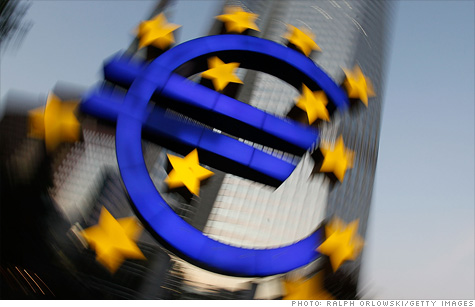Search News

The ECB cut a key interest rate as economic conditions deteriorate in the wake of the deepening debt crisis.
NEW YORK (CNNMoney) -- The European Central Bank took steps Thursday to revive the ailing European economy and ease credit conditions for troubled eurozone banks.
But ECB president Mario Draghi offered no indication that he is willing to intervene aggressively in the bond market, stressing that the onus is on European governments to resolve the debt crisis.
The comments came as Draghi prepares to meet with other European Union leaders later Thursday in Brussels for a crucial summit that many say could decide the fate of the euro currency.
The ECB has been under pressure to make large-scale purchases of government bonds to help prevent the spread of debt contagion in the euro area. But Draghi has repeatedly said that the ECB's only mandate is to manage inflation and EU treaties prohibit it from financing governments outright.
"There should be this respect of the spirit of the treaty always in our minds," he said.
Draghi also rejected a proposal to funnel loans from the ECB or individual European central banks into the International Monetary Fund.
"If the IMF were to use this money exclusively to buy bonds in the euro area we think it's not compatible with the treaty," he said.
Draghi again called for euro area governments to adopt a "fiscal compact" to ensure that budgetary discipline is respected and enforced. He said the agreement should include "ex ante" constraints on fiscal policies, which would essentially give EU authorities veto power over individual member states' budgets.
EU leaders are expected to begin the process of forming a so-called fiscal union at this week's summit. The leaders of France and Germany have proposed amending or rewriting EU treaties to include automatic sanctions for governments that fail to achieve deficit targets.
Draghi said the ECB has a role to play as "the guardian of stability" in the eurozone, but he said the current debate is "eminently political."
"What is happening in these very hours is a redesigning of the fiscal agreement...in a way that would enhance, rebuild confidence in the euro area," he said. "The ultimate decisions are really in the hands of the leaders."
As expected, the ECB cut its main interest rate to 1% from 1.5%, as the European economy appears headed for a mild recession.
It also announced a series of "non-standard measures" to provide extra liquidity for banks that have been struggling to secure financing in bank funding markets.
The bank will now accept certain asset-backed securities with the "second best rating" as collateral for bank loans. It will also cut its reserve ratio requirement for banks to 1% from 2% to free up capital and boost lending.
In addition, the ECB will hold two 3-year refinancing operations to replace 1-year facilities that are due to expire this month, and discontinue a technical operation to help support money markets.
Stock markets in Europe and the United states fell after the ECB announcement. Investors had been betting that the central bank would step up its bond buying program if EU leaders showed a commitment to fiscal discipline.
The ECB resumed buying government bonds on a limited basis earlier this year as part of an emergency program to keep yields in check.
Italy and Spain have seen their borrowing costs rise to unsustainable levels, although rates came down last week. The fear is that those countries could fall victim to the debt crisis that has already taken down Greece, Ireland and Portugal.
The ECB, which has the ability to print money, is seen as the only European institution with the financial firepower to restore market confidence and stabilize borrowing costs for troubled EU governments.
But the bank's leaders have been divided on how to proceed, with its German stakeholders deeply opposed to buying bonds.
Critics say printing money will lead to inflation and bailing out governments will create a dangerous "moral hazard."
In response, supporters of greater intervention say the euro currency may not survive the crisis unless the ECB becomes a lender of last resort for member states. ![]()
| Overnight Avg Rate | Latest | Change | Last Week |
|---|---|---|---|
| 30 yr fixed | 3.80% | 3.88% | |
| 15 yr fixed | 3.20% | 3.23% | |
| 5/1 ARM | 3.84% | 3.88% | |
| 30 yr refi | 3.82% | 3.93% | |
| 15 yr refi | 3.20% | 3.23% |
Today's featured rates: